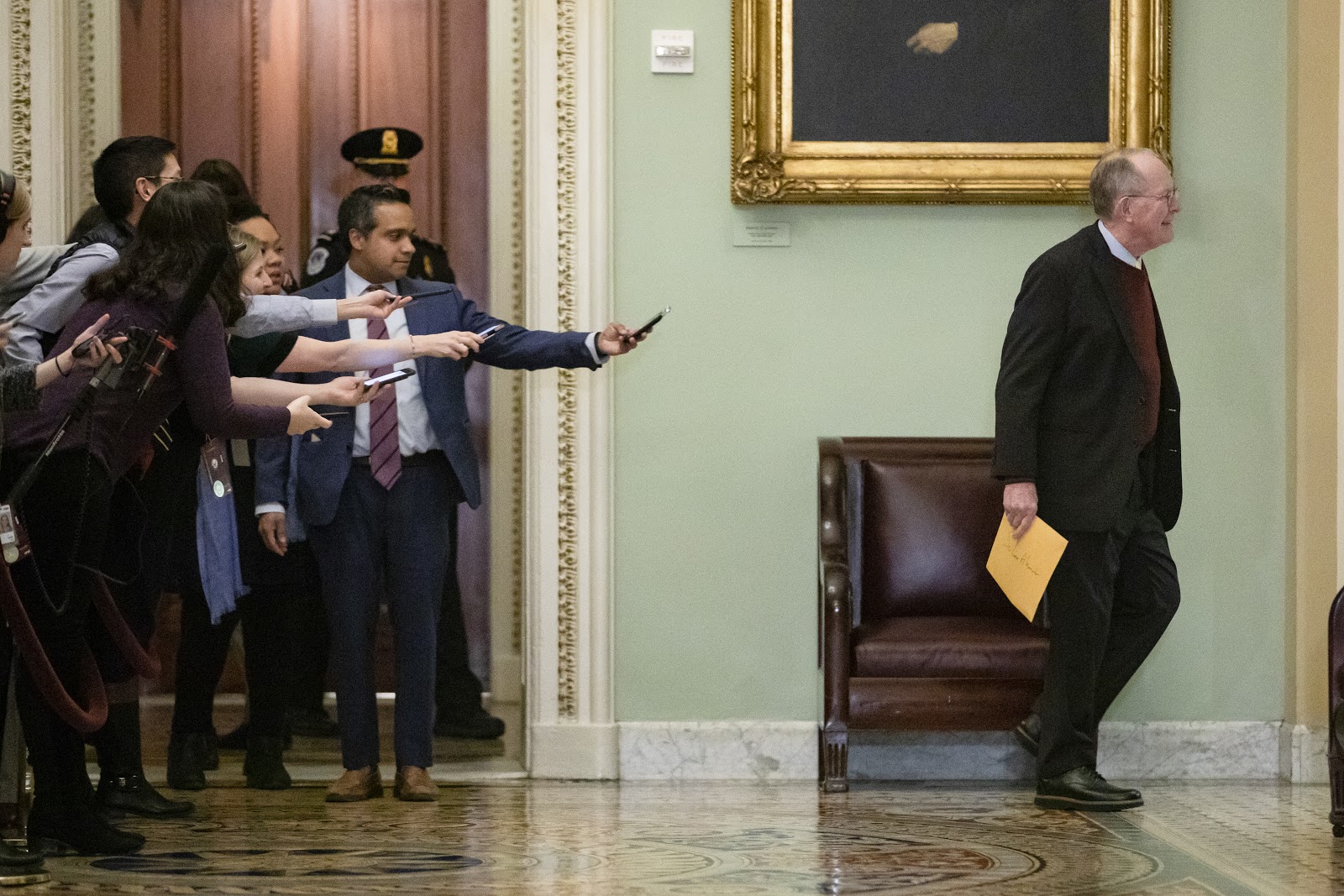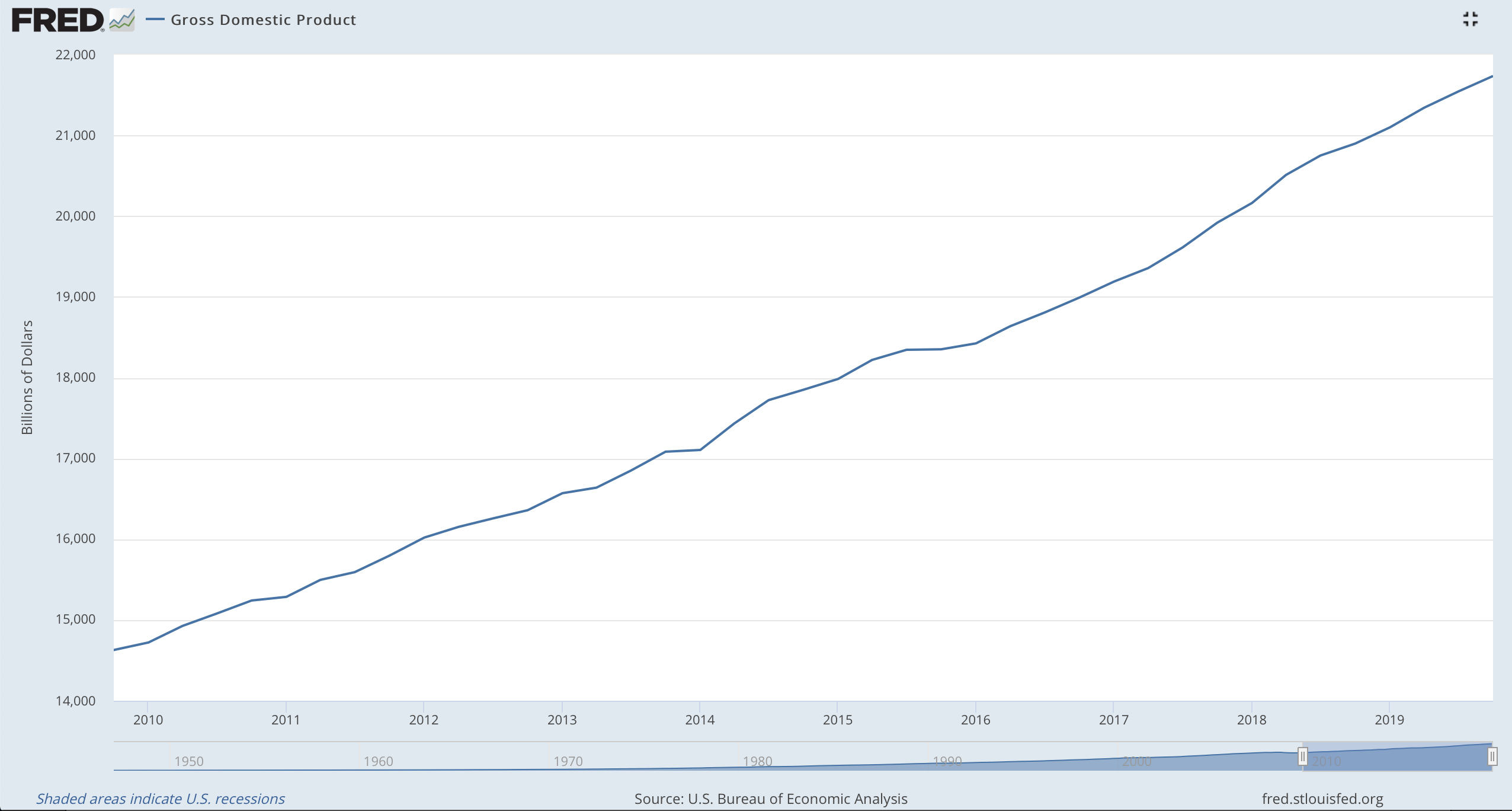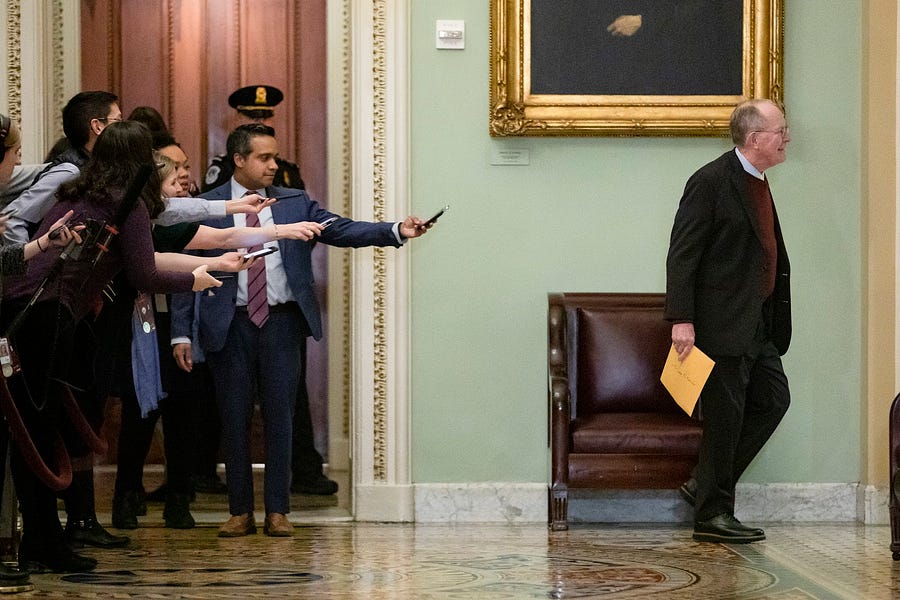Happy Friday! With Sen. Lamar Alexander announcing he’s a “no” on additional impeachment trial witnesses, this whole thing could very well be wrapped up by the next time we’re in your inbox. What a journey we’ve been on together—didn’t we tell you we knew how it would end?
Quick Hits: Today’s Top Stories
-
The White House created a new task force, headed by Health and Human Services Secretary Alex Azar, to deal with the coronavirus outbreak, just as the Centers for Disease Control confirmed the first human-to-human transmission of the virus within the United States. The World Health Organization declared the outbreak a global public health emergency, and the State Department issued a travel advisory, warning Americans to steer clear of China due to the virus.
-
Full-year gross domestic product (GDP) growth for 2019 came in at 2.3 percent, according to the Department of Commerce, compared to 2.9 percent in 2018.
-
The rate of fatal drug overdoses in the United States declined in 2018 for the first time in nearly 30 years.
-
The number of troops being treated for traumatic brain injuries following Iranian attacks on U.S. bases in Iraq earlier this month has climbed to 64.
-
The House voted 236-166 to repeal the 2002 authorization for the use of military force (AUMF) in Iraq, and 228-175 to block funding for military action against Iran. President Trump has been critical of the legislation, but also told lawmakers to “vote their heart.”
-
The Trump administration unveiled a new plan that would curb Medicaid spending by allowing states to convert portions of funding for the program into block grants.
-
Former Trump campaign aide Carter Page is suing the Democratic National Committee for its commissioning of the Steele dossier.
Not With a Bang but With a Whimper

Well, folks, we’re here: Barring extraordinary new developments, today’s the day President Trump’s impeachment trial will come to an end. Late Thursday night, outgoing GOP Sen. Lamar Alexander released a statement arguing the House had already called sufficient witnesses to prove their case that Trump had acted wrongly in pressuring Ukraine to investigate the Bidens and the DNC. But Alexander continued, saying that those actions did not rise, in his judgment, to the level of an impeachable offense. Since the primary allegation had already been proven, he said, there was no need to call further witnesses, and he would vote against doing so.
“The question then is not whether the president did it, but whether the United States Senate or the American people should decide what to do about what he did,” Alexander said. “I believe that the Constitution provides that the people should make that decision in the presidential election that begins in Iowa on Monday.”
More than likely, Alexander’s vote is all McConnell will need. At this point, even if Sen. Lisa Murkowski joins Mitt Romney and Susan Collins in voting to call more witnesses, Democrats will be unable to muster anything more than a 50-50 tie—insufficient to pass the witness motion barring an unexpected tie-breaking intervention from Chief Justice John Roberts. With the question of more witnesses out of the way, McConnell will move at once to the key vote: To acquit President Trump, or to remove him from office. At this point, we probably don’t need to tell you how that one’s likely to go—although it will be interesting to see whether that vote breaks down strictly along party lines.
It’s worth noting in passing that the argument Sen. Alexander is making is an entirely fair one: If the case against President Trump has already been proved, then why are more witnesses required? Why not skip straight to the “sentencing” step of whether it justifies removal?
The trouble, of course, is that this wasn’t the argument advanced by most of his colleagues in the Senate Republican Conference. By and large, Alexander’s peers preferred to stick with Trump’s own rhetorical line—that the president did nothing wrong, that he was actually crusading against corruption in Ukraine, and that the whole scandal was confected by low-level bureaucrats playing telephone with each other and scurrilous, politically motivated Democrats.
When Bolton suddenly agreed to testify, those Senate Republicans were thus placed in a difficult position: They were forced to continue to say “there’s nothing to see here” while actively suppressing efforts to get more clarity on what had happened. That position had the downside of being entirely incoherent but the upside of not crossing Trump on messaging.
It’s the Economy, Stupid
As noted in “Quick Hits,” the Commerce Department released a treasure trove of macroeconomic data Thursday. Although one of your Morning Dispatchers was an economics major for a semester before switching to history, we wanted to bring in an actual expert to break down the GDP numbers. Enter James Pethokoukis of the American Enterprise Institute. What follows is our conversation, lightly edited for length and clarity.
TMD: Obviously the topline number—2.3 percent GDP growth for the year—came in below the 2.9 percent growth of 2018 and 2.4 percent growth of 2017. Would you characterize this as a significant slowdown?
James Pethokoukis: I think that given demographics such as how fast [the] U.S. labor force is expanding and productivity growth, America has an economy that should grow about 2 percent, right? So the fact that we’re growing at about 2 percent, that’s why the Fed’s not doing anything, because this is kind of what U.S. growth is right now …

… If you look at the chart since the end of the Great Recession in 2009, it looks amazingly steady, and it’d be very difficult—you would look at it, and you would not think much has been done on policy in the past 10 years, because it looks very steady, whether it’s actually GDP numbers, or even job numbers. So overall, the Trump economy looks just kind of like a natural trend, like an extension of the Obama economy.
TMD: Would you say this reversion closer to that 2 percent figure is the result of tariffs and the trade war, or does it have more to do with the initial boost of the 2017 tax cuts wearing off over time?
Pethokoukis: I think the expectation that the tax cuts would sort of very quickly change that growth trajectory, I think was overly optimistic. We did see a little bump up in growth, but that’s the sort of impact of tax cuts that Republicans generally aren’t aiming for. There’s a kind of a quick burst, you put more money in the system, and there’s more consumer spending, people have more money in their pockets. Generally when Republicans and conservatives are for tax cuts it’s because those tax cuts will change incentives to work and invest, and over the long term, more of us would work, more of us would invest, we’d have a more productive economy. That aspect of the tax cuts, it really has yet to be in evidence. And maybe that’s because the tax cuts just didn’t work, or because they’ve been offset because of the trade war, especially causing a lot of uncertainty. So we had this quick blip up, and now we’re back to kind of where we were.
TMD: There’s a habit for many, both in the media and across the country, to attribute the performance of the economy, good or bad, to the current president. How much of the credit, or blame, for current economic conditions can be traced back to Trump and his policies, and how much of it is the result of a natural business cycle?
Pethokoukis: Well I think the fundamental macroeconomic factors would suggest that the U.S. has about a 2 percent economy. And that’s what we’re doing. And we had a couple of big policy things on taxes and trade, which certainly, it’d be reasonable to suggest that they offset each other to some point. But that’s the kind of thing that economists will be going and looking back at years trying to tease out the impact of both. But as kind of a first print of history, you would say that one thing happened, which generally people would think would boost economic growth. And then another thing happened, which people generally think would be bad for economic growth. The thinking that, to some extent, they may have offset each other, now that’s not an unreasonable thing. Things like regulation, just because you announce that something’s going to be deregulated, or you are going to remove a regulation, it takes a long time for that to happen. I think you can say that there’s certainly been a slowing flow of regulation. I don’t think there’s been a deregulation of the American economy. But they seem to be adding newer ones at a slower pace.
But listen, let’s say the tax cuts sort of quote unquote worked. And the way they were supposed to work is there’d be more business investment—which there was only a brief surge of business investment, which has dissipated—but there’d be more business investment and workers would become more productive, and you’d have faster GDP growth, and higher worker wages. That whole process, I don’t think anyone thought that process was going to happen over 18 months or even two years. That’s how politicians talk about it. But that’s not how very many economists thought about it. So in a way, it’s still kind of too early to tell if the tax cuts, quote unquote worked.
TMD: The Congressional Budget Office projected earlier this week that the deficit would surpass $1 trillion for the first time since 2012. The economy is in a pretty good spot right now. Shouldn’t we expect deficits to be shrinking during an economic boom like this?
Pethokoukis: Well, I mean the last time we had trillion-dollar deficits, the economy was collapsing. It’s not collapsing now, it’s in pretty decent shape. Ideally you would like deficits to be going down and you would like the overall national debt to be on a glide path towards some lower level. Clearly that’s not happening. Deficits are getting bigger, and our glide path, it’s gliding higher. Which would suggest that that’s something policymakers should be pointing to and not ignoring. Right now, obviously, they’re ignoring. But generally, when times are good like this, you want to be taking care of things like the deficit, so theoretically in kind of a downturn that you don’t worry so much about bigger deficits and you don’t worry so much if you want to do fiscal stimulus. Clearly that’s not the case right now. But yet that’s exactly how politicians are acting.
TMD: Were there any other particular data points released by Commerce today that stood out to you?
Pethokoukis: I think business investment. Business investment is what the sort of pro-growth effects of the tax cut were supposed to affect. And there was a brief surge right after [the] tax cut was passed for a quarter or two, but we haven’t seen it since then. And so again, you can either conclude the tax cuts don’t matter, or you can conclude there was something else going on in the economy that led businesses to hold off on investing. The obvious thing is the biggest trade war in almost a century. That’s where I would look first. Now maybe we’ll find out after further research that that wasn’t the case, but that would be a very likely culprit.
Worth Your Time
-
Business visionary Clayton Christensen passed away last week at the age of 67. Tech columnist Kara Swisher wrote about what Christensen meant to Silicon Valley, and why he will be sorely missed. “Professor Christensen’s book came out a year before Google was founded, seven years before Facebook, eight years before YouTube and 11 years before Uber. Each of these companies, knowingly or unknowingly, would follow his map.”
-
The final episode of NBC’s The Good Place aired last night, and some Morning Dispatcher tears may have been shed. The show had one of the most complex premises of a sitcom in recent memory—we encourage you to check out this Ezra Klein podcast with the show’s creator Michael Schur and consulting sophist Pamela Hieronymi on how they devised the moral philosophy of the program. [Editor’s note: No editor tears were shed.]
Presented Without Comment
Something Fun
Coming this summer from Wes Anderson: The David French/Morning Dispatch crossover you didn’t know you needed.
Toeing the Company Line
-
David’s Thursday French Press took a look at the dangerous precedent Alan Dershowitz’s impeachment arguments could set, before turning to Ezra Klein’s new book on political polarization: “We’re clustering in like-minded enclaves, and those like-minded enclaves are growing more extreme (and extremely opposed) in their politics.” Give it a read here!
-
Jonah also takes on Dershowitz’s argument: “So a president who gets fall-down drunk every day and fails to fulfill the barest minimum of his duties cannot be impeached because getting drunk isn’t a crime. Do you want to validate that nonsense?”
-
We sent Andrew to Iowa, and he went to an Amy Klobuchar event that featured endorsers, a hot-dish dinner, and … no Klobuchar, who was back in D.C. for the impeachment trial. Can she still get her message out?
-
A note from us: Due to some production issues, two articles meant for the web site have gone out as emails in recent days. We apologize for the inconvenience and overcrowding your inbox (and—for some of you—the bizarre Christmas/Hanukkah gift-subscription reminder) and thank you for bearing with us as we work out the kinks in the system.
Let Us Know
Yesterday we asked you for the best use of this new emoji being introduced later this year. Our readers took us on a trip around the globe.
-
In Israel the pinched fingers symbol usually means “have patience” or “wait for a second.”
-
The Argentines have co-opted this gesture from the Italians but put their own twist on it. When you combine it with a skeptical face, it means, “Oh, come on now!” and when combined with an incredulous one (and a little extra wrist action) it communicates, “You really don’t expect me to believe that, do you?”
-
To signal that unicode should have stuck to its original purpose of covering all modern languages in 16 bits.
-
I thought it was the “chef’s kiss” where you pinch your fingers next to your lips and then do an explosive flourish where you spread germs throughout the kitchen.
Reporting by Declan Garvey (@declanpgarvey), Andrew Egger (@EggerDC), Sarah Isgur (@whignewtons), and Steve Hayes (@stephenfhayes).
Photograph of Lamar Alexander by Samuel Corum/Getty Images.







Please note that we at The Dispatch hold ourselves, our work, and our commenters to a higher standard than other places on the internet. We welcome comments that foster genuine debate or discussion—including comments critical of us or our work—but responses that include ad hominem attacks on fellow Dispatch members or are intended to stoke fear and anger may be moderated.
With your membership, you only have the ability to comment on The Morning Dispatch articles. Consider upgrading to join the conversation everywhere.